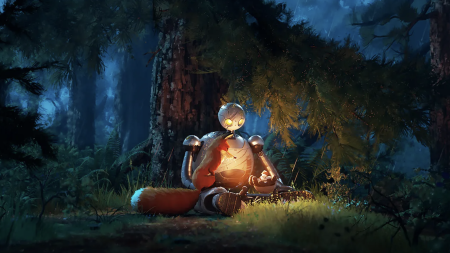'The Wild Robot' director talks bringing beloved children's book to big screen with emotional depth

When it comes to making children’s films, director Chris Sanders doesn’t believe in relying on cheap gags or inappropriate humor; he’d rather weave deeply human themes into a visually captivating story to draw audiences.
“I'm not good at gags,” the 62-year-old filmmaker told The Christian Post. “Whenever somebody invites me to a gag session to work on another film, I never have much to do. I never come up with anything. I think the kind of humor that I do just comes out of situations and you find it along the way. It’s just my style.”
It was this thoughtful approach to filmmaking that made Sanders, the director behind “Lilo and Stitch,” the perfect person to bring Peter Brown’s beloved children’s book The Wild Robotto the big screen.
Hitting theaters on Sept. 27 and featuring the voices of Lupita Nyong'o, Pedro Pascal, Kit Connor and Bill Nighy, the DreamWorks Animation film tells the story of Roz, a robot who is shipwrecked on a remote, wild island. Though programmed only with basic functions and lacking the emotional or survival instincts needed to thrive, Roz unexpectedly becomes the caretaker of a gosling named Brightbill after its family is killed.
As a first-time “parent,” Roz faces the challenges of raising a child without any programming or knowledge of how to do so. However, she eventually develops emotional depth, forms meaningful relationships with the island’s inhabitants, and learns what it means to nurture, protect and ultimately let go.
For Sanders, the connection to The Wild Robot was a deeply personal one. He first encountered the book through his daughter’s school assignment, where he said the core themes of parenting, kindness and the bittersweet process of watching children grow up immediately resonated with him.
“Roz, who is a first-time parent, quite by accident and unexpectedly so, says, ‘I don’t have the programming,’” Sanders told CP. “She literally tries to walk away, like, ‘Nope, I can’t do it.’ It’s such a relatable moment, especially for parents who often feel like they’re figuring it out as they go.”
The first installment in the “Robot” trilogy, Brown’s book explores themes of survival, adaptation, community and the unexpected joys and hardships of parenting. A New York Times bestseller, it also delves into the idea that kindness and empathy, even in a machine, are essential to surviving and thriving in a challenging world, all themes Sanders wanted to highlight in the film adaptation.
“In my very first conversation with Peter, he said something that became very important to me: ‘Kindness can be a survival skill,’” Sanders recounted. “That became a big theme in the story, and it’s one of the things that I think makes this film so meaningful.”
The notion of “exceeding your programming” also plays a central role in the film. Roz, who begins her journey as a robot programmed for efficiency, gradually learns that the key to surviving — and thriving — is improvisation.
“Roz says she doesn’t have the programming to parent,” Sanders explained, “but she tries and improvises. It’s such a beautiful idea because it’s true for all of us. You’ll face unexpected challenges, and sometimes you have to figure it out on the fly.”
For Sanders, the emotional depth of Roz’s journey from reluctant guardian to devoted mother offers an arc that speaks to both adults and children.
“Roz devotes herself to this task without realizing that if she does a really good job, it’s going to end in heartbreak,” Sanders said, comparing it to the fleeting joy of building a snowman. “If you do a good job, eventually it melts. That’s real life. There’s a moment in the movie where Brightbill, Roz’s gosling, has to succeed at migrating. Roz’s success as a parent means letting go, and it’s both beautiful and hard.”
Sanders also highlighted the humor woven through the story, particularly in the character of the possum Pinktail, voiced by Catherine O’Hara.
“Pinktail has possums, three litters a year, so she’s over the whole newness of parenting. She’s pragmatic and unsentimental, which makes for some really funny moments,” he said.
This dynamic between Roz’s tentative steps into parenthood and Pinktail’s seasoned indifference offers a range of perspectives that parents, no matter their stage in the journey, will find deeply relatable, he said.
The score for "The Wild Robot" is composed by Chris Bowers, who also created the music for "Green Book," "King Richard," "The Color Purple" and others. For Sanders, Bowers’ understanding of the story was pivotal.
“He just got it,” Sanders said. “One of my favorite moments in the score is during the migration scene. There’s this unresolved tension because Brightbill has learned a lot, but there isn’t time to address everything before he leaves the island. It’s one of my favorite parts of the film because it feels so true to life.”
When asked why The Wild Robot continues to captivate readers of all ages, Sanders pointed to its balance of joy and sorrow.
“Peter Brown didn’t shy away from hard things. There are moments of triumph and heartbreak, and we’re all drawn to that. You don’t want to sugarcoat life because it’s both joyful and hard. Those are the stories that endure,” he said.
Like the book, Sanders said he hopes the “The Wild Robot” film will foster a deeper understanding between parents and children. “I hope it opens hearts and makes people more emotionally available,” he said. “Maybe it even makes some things safe to talk about.”
“The Wild Robot” is rated PG for action/peril and thematic elements and hits theaters on Sept. 27.
Leah M. Klett is a reporter for The Christian Post. She can be reached at: [email protected]






















